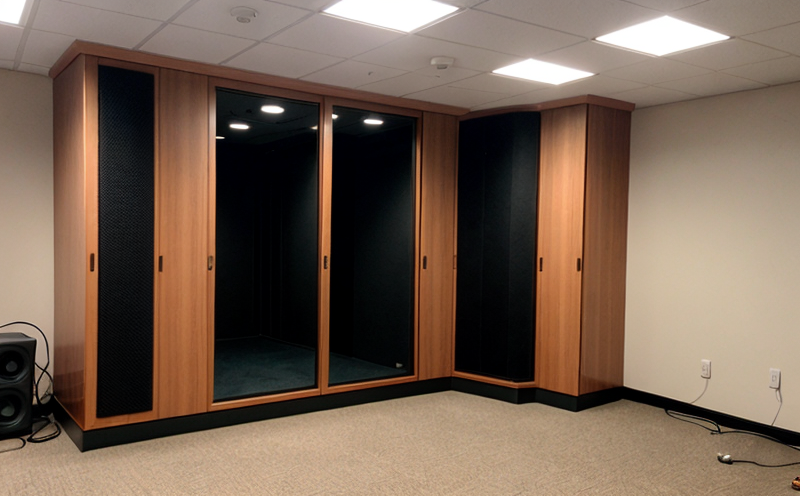IEC 60959 Microphone Free-Field Calibration Testing
The International Electrotechnical Commission (IEC) Standard IEC 60959 is an essential guideline for calibrating microphones used in various acoustic environments. This standard ensures that the microphones are accurately measuring sound pressure levels, which is critical for industries ranging from audio engineering to environmental monitoring.
The primary purpose of this test is to verify the accuracy and performance of measurement microphones under free-field conditions. During a free-field calibration, the microphone is placed in an environment where it can measure sound waves without interference from other surfaces or objects. This ensures that any measured data reflects the true acoustic properties of the source.
The process begins with selecting the appropriate standard microphone for comparison against the unit under test (UUT). The UUT and reference microphone are then placed in a free-field chamber, where they are subjected to controlled sound pressure levels. The measurement system is calibrated using known sound sources at various frequencies and intensities.
During the calibration process, the output signals from both microphones are recorded and compared. Any discrepancies between the two outputs indicate potential errors in the UUT, which can then be corrected or replaced if necessary. This ensures that any subsequent measurements made by the microphone adhere to the highest standards of accuracy.
The testing process is governed by IEC 60959, which specifies detailed procedures for both the calibration and verification of microphones. Compliance with this standard is crucial for maintaining consistency in sound measurement across different environments and applications. This ensures that measurements taken by calibrated microphones are reliable and comparable.
The accuracy of a microphone directly affects the quality of data collected in various fields, including audio engineering, acoustic research, and environmental noise monitoring. Inaccurate measurements can lead to misinformed decisions, leading to suboptimal products or ineffective solutions. By adhering to IEC 60959, we ensure that our clients receive accurate and consistent results.
Our calibration services are designed to meet the stringent requirements of this standard, providing clients with confidence in their measurements. We use state-of-the-art equipment and follow rigorous procedures to achieve precise calibrations. Our team of experts ensures that every step of the process is conducted meticulously, from initial setup to final verification.
The IEC 60959 standard also emphasizes the importance of traceability, ensuring that all measurements can be traced back to primary standards. This not only enhances the credibility of our results but also facilitates interoperability between different measurement systems and laboratories worldwide.
By providing accurate and reliable calibration services based on IEC 60959, we contribute to the overall quality and reliability of acoustic measurements in numerous sectors. Our commitment to precision and accuracy ensures that clients can trust our results, leading to better-informed decisions and more effective solutions.
Benefits
The IEC 60959 Microphone Free-Field Calibration Testing offers numerous benefits for quality managers, compliance officers, R&D engineers, and procurement professionals. Firstly, it ensures that the microphones used in various applications are accurately measuring sound pressure levels.
Accurate measurements are critical for maintaining product quality and ensuring compliance with industry standards. This testing helps prevent costly errors and inefficiencies by guaranteeing precise data collection. By adhering to IEC 60959, we help our clients achieve consistent and reliable results across different environments and applications.
Our calibration services also enhance the credibility of your measurements. Compliance with this standard is essential for maintaining a good reputation in competitive markets. Accurate and traceable data can lead to better-informed decisions, which ultimately result in superior products and solutions.
The testing process helps identify any potential issues early on, allowing for timely corrections or replacements. This proactive approach ensures that the microphones used are always performing at their best, leading to improved product performance and reliability.
In addition to ensuring accuracy and consistency, our calibration services also contribute to environmental monitoring efforts. By providing reliable data on sound pressure levels, we can help monitor noise pollution, assess acoustic environments, and develop effective solutions for reducing noise.
Eurolab Advantages
EuroLab offers a range of advantages when it comes to providing IEC 60959 Microphone Free-Field Calibration Testing. Our state-of-the-art facilities and experienced team ensure that every aspect of the testing process is conducted with precision and accuracy.
Our laboratories are equipped with the latest equipment, ensuring that we can provide reliable and consistent results. This includes high-quality microphones and sound sources, as well as advanced calibration software. Our experts have extensive experience in this field, allowing them to identify potential issues early on and provide timely solutions.
We offer a comprehensive range of services, from initial setup to final verification. Our team works closely with clients to understand their specific needs and requirements, ensuring that the testing process is tailored to meet those needs. This personalized approach ensures that our clients receive accurate and reliable results every time.
Our commitment to precision and accuracy extends beyond just the testing process. We also provide ongoing support and guidance to help clients interpret and utilize their data effectively. Our team of experts can offer advice on how to improve measurement techniques or develop new solutions based on our findings.
EuroLab’s strong reputation in the industry further enhances the credibility of our results. Clients can trust that they are receiving accurate, reliable, and traceable measurements from a respected laboratory. This ensures that their measurements are accepted and recognized by regulatory bodies worldwide.
Our flexible service offerings allow us to accommodate clients with different budgets and timelines. Whether you need a one-time calibration or ongoing support, we have the resources and expertise to meet your needs. Our competitive pricing and comprehensive services ensure that our clients receive excellent value for their investment.
Why Choose This Test
The IEC 60959 Microphone Free-Field Calibration Testing is an essential service for anyone involved in sound measurement and analysis. The standard ensures that microphones are accurately measuring sound pressure levels, which is critical for maintaining product quality and ensuring compliance with industry standards.





